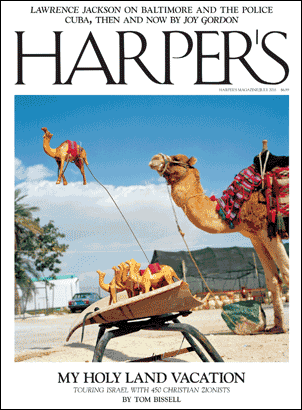Inside the July Issue
Tom Bissell on touring Israel with Christian Zionists, Joy Gordon on the Cuban embargo, Lawrence Jackson on Freddie Gray and the makings of an American uprising, a story by Paul Yoon, and more
 If your summer vacation is looking dull, consider bringing Tom Bissell along as your guide. In this month’s Folio, Bissell joins a group of Christian Zionists for a ten-day tour of Israel organized by the conservative radio host Dennis Prager. “I wanted to more fully understand why conservative politics had become synonymous with no-questions-asked support of Israel,” writes Bissell. The tour begins as right-wing propaganda, but soon turns into something far stranger. When a beloved tour guide named David gets fired mid-trip, Bissell’s group decides to revolt. Strategies are debated; a petition is circulated. Bissell and the pro-David faction interrogate anti-David travelers, hassle tour-company representatives to reinstate their guide, and eventually decide to occupy their bus. “It works for liberals!” one tourist tells Bissell. “Let’s make it work for us.”
If your summer vacation is looking dull, consider bringing Tom Bissell along as your guide. In this month’s Folio, Bissell joins a group of Christian Zionists for a ten-day tour of Israel organized by the conservative radio host Dennis Prager. “I wanted to more fully understand why conservative politics had become synonymous with no-questions-asked support of Israel,” writes Bissell. The tour begins as right-wing propaganda, but soon turns into something far stranger. When a beloved tour guide named David gets fired mid-trip, Bissell’s group decides to revolt. Strategies are debated; a petition is circulated. Bissell and the pro-David faction interrogate anti-David travelers, hassle tour-company representatives to reinstate their guide, and eventually decide to occupy their bus. “It works for liberals!” one tourist tells Bissell. “Let’s make it work for us.”
For her Easy Chair column, Rebecca Solnit finds in the archetype of the American cowboy the modern conservative ethos of personal responsibility. “The loner taketh not, nor does he give; he scorneth the social and relies on himself alone,” she writes. It’s a dangerous and misguided view of the world. Never is this more apparent than in the case of climate change: “As the fact of climate change has become more and more difficult to deny, the ideologues of isolation deny instead our responsibility for the problem and the possibility that we are capable of acting collectively to do anything about it.”
In her Report from Cuba, Joy Gordon examines the United States’ embargo of Cuba, which since 1960 has denied Cubans access “to everything from electricity to video games to shoes.” Despite the fact that two thirds of Americans don’t support the embargo, Congress has given no sign of repealing it. In May, Barack Obama declared that his historic visit to the country—the first by a sitting U.S. president since Calvin Coolidge—marked a “new day” for the United States and Cuba; but so long as the country’s economy continues to struggle, Gordon remains skeptical. “For all the improvements in U.S.–Cuban relations over the past two years,” she writes, “that new day will not really come until the embargo is lifted in its entirety.”
In Lawrence Jackson’s Letter from Baltimore, he weaves the story of his family’s migration to the city with its brutal implementation of the broken-windows policing theory on its streets and in its schools. “Who doesn’t know,” Jackson asks, “that as American cities became blacker in the Fifties and Sixties, police departments felt fewer qualms about ‘cleaning them up’ with deadly force?” Jackson writes of the men he’s known who were killed in fatal encounters with police, and of his own near-fatal experiences. To protest the unjust killings not just of Freddie Gray but also of generations of black women and men, Jackson concludes, “a riot makes a lot of fucking sense.”
Also in this issue: Lyle Rexer on why we take—and share—so many photographs; new fiction by Paul Yoon and Alejandro Zambra; Caleb Crain on Sybille Bedford; Nick Laird on Seamus Heaney’s translation of the Aeneid; and Christine Smallwood on Hisham Matar’s The Return, John Cassavetes: Interviews, and Pond, a debut work of vignettes by Claire-Louise Bennett.


